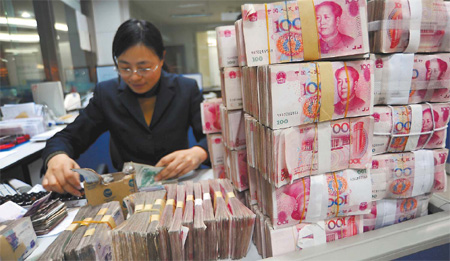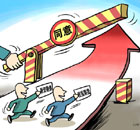Economy
Rocky road to recovery for China
By Xin Zhiming (China Daily)
Updated: 2010-01-12 08:18
 |
Large Medium Small |
When he invested in a new apartment in Beijing last May, Zhang Xiaoliang had no expectations of making a quick profit. But little more than six months on, the value of his new home has soared 40 percent.
"I made the right choice," said the 30-year-old manager of an electric appliance sales company in Beijing. "If I had not bought when I did, I would not be able to afford it now."
Like thousands of young people in the capital and other major Chinese cities, the rapid V-shaped upturn in house prices came as a surprise.
The nation's booming housing sector, although deepening young people's fears of being priced out, has become a pillar of the country's unexpectedly quick economic recovery out of the global recession.
Investment in the sector accounted for about a quarter of China's fixed-asset investment last year, which in turn made up about 90 percent of its economic growth; shaking off the pessimistic fears of early 2009 when the economy hit a trough.
The government lowered sales taxes on small cars and imposed appliance subsidies worth billions of yuan; moves that saw China become the world's largest auto market and sparked a rise in household consumption respectively.
During the first three quarters of 2009, retail sales added 4 percentage points to GDP growth, contributing to more than 40 percent of GDP. Economists expect year-on-year GDP growth will be higher than 8 percent, the goal set by policymakers early last year.
The other major growth driver is State-funded investment spending on infrastructure, which is estimated to have exceeded 900 billion yuan ($130 billion) in 2009. Industrial output, a major indicator for manufacturing, grew by 19.2 percent year-on-year in November, while fixed investment growth slowed to a relatively 32.1 percent, both impressive compared with the level in the pre-recession years.
A slump in exports hit the overall economy, causing a drop of 3.6 percentage points of GDP growth for the first three quarters. However, it has shown solid signs of improvement recently, including in export orders, which are up according to the official purchasing managers' index, a main gauge of economic activities.
The December trade figures, which were released Sunday, with export expanding by an unexpected 17.7 percent year-on-year, further consolidated the country's economic growth uptrend.
As the economy steamed out of the crisis, economists have become upbeat about the country's prospects this year.
"All indicators promise solid growth in the first and second quarters of 2010," said Virendra Singh, director of the Moody's Economy.com, which offers independent financial analysis. "The sharp decline in trade has been stemmed, the rise in urban unemployment has ended, and producers and consumers are feeling more optimistic."
China's economy is marching at a healthy clip. "The fiscal stimulus and loose monetary policy are doing their job," said Singh in a recent report.
















